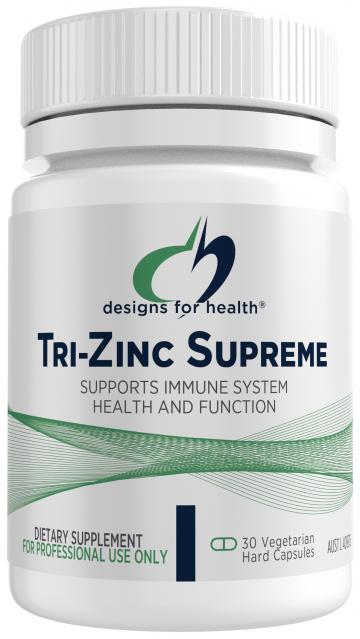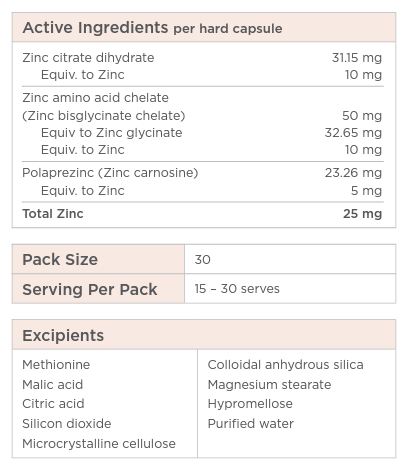This is a partitioner-only product. Purchasing this product/supplement requires either:
Designs for Health (AU)
Tri-Zinc Supreme- Designs for Health (AU)
Tri-Zinc Supreme- Designs for Health (AU)
Couldn't load pickup availability
Tri-Zinc Supreme in New Zealand
- Contains 25 mg total elemental zinc for dosing flexibility
- Curated excipient profile to further facilitate absorption
- Supports the health and function of the immune system
- Maintains the health of skin and supports wound healing processes
- Supports eye health and maintains healthy vision
- Maintains bone health
- Supports testosterone levels
Zinc is a vital trace nutrient that displays activity in every human cell. The body contains around 2g zinc, 55-60% of which can be found in skeletal muscle, 25-30% in bone and the remaining distributed throughout other bodily fluids and tissues.
Zinc belongs to the class of type 2 nutrients, which are considered to be the building blocks of all cells. The synthesis of any new tissue requires type 2 nutrients, and zinc’s main biological functions are, therefore, catalytic, structural, or regulatory in nature.
The human body holds around 2-3g of zinc, which is distributed throughout the body. Intracellular levels are tightly controlled. An estimated 0.1% of zinc is found in serum, 60% is stored in skeletal muscle, 30% in bone and 5% in the skin. Zinc is also distributed in small amounts among other tissues, including the brain, kidneys, liver, and heart.
Zinc metalloenzymes are the most abundant of all trace mineral-dependent enzymes in the body, and as a result, zinc is involved in many cellular reactions required for the normal biological activity of the immune system, skin and bone.
Immune Function
Being innately involved in the normal development and function of all cells, Zinc is vital for the optimal functioning of the immune system. Zinc presides over the effective commission of both innate and adaptive immunity, assisting with the health and functioning of neutrophils, monocytes and NK cells, as well as the development of T & B-lymphocytes, macrophages and NK cells, as well as the generation of acquisitional immunity. Zinc’s involvement in immune processes is also intricately tied to inflammation and wound healing.
Wound Healing & Skin Health
The skin contains around 5% of the total body store of zinc (50-70μg/g dry weight), mostly sequestered in the epidermis. Zinc is essential for producing zinc finger motifs and biomembranes in DNA transcription factors and is therefore required for building all new body tissues.
It is required for the proliferation and differentiation of keratinocytes, stratum corneum formation and metabolism and epidermal tight junction function. Any imbalance of epidermal zinc stores affects enzyme and transcriptional activity and zinc finger protein function, ultimately resulting in epidermal barrier dysfunction and sub-optimal skin health.
Zinc deficiency can also hamper wound healing, and supplementation and topical application can be used to restore zinc levels, enhance re-epithelialisation and collagen synthesis, reduce inflammation, and enable optimal wound healing.
Eye Health & Vision
Zinc is present in high concentrations in the retina and choroid of the eye. It functions as both a tissue protectant having antioxidant activity in the retina and retinal pigment epithelium (RPE) and a visual function aid in that it modulates synaptic transmission, modifies plasma membranes in the photoreceptors and regulates the light-rhodopsin reaction. It is also involved in the enzymatic conversion of retinol to retinal, which is a critical step in the visual cycle.
Bone Health
Around 30% of the total body zinc stored resides in skeletal tissue; adequate dietary intake is vital to ensure bone quality. Zinc is a vital cofactor for several enzymes involved in producing bone matrix components and oversees the cycle of bone deposition and resorption. It is also complexed with fluoride in hydroxyapatite crystals.
Testosterone Levels
The steroid receptor superfamily of transcription factors is zinc-dependent. These zinc finger transcription factors arbitrate the physiological response to numerous hormonal and metabolic signals. Inadequate zinc intake has been linked to low serum concentrations of several hormones, including testosterone.
Directions to use:-
Adults, take 1-2 capsules daily with a large glass of water or as directed by your healthcare professional. Take with food.
Allergen Information
- No added: Gluten, dairy, soy, or nuts
Warnings:-
If symptoms persist, seek the advice of a healthcare professional Vitamins and minerals should not replace a balanced diet. Contains zinc which may be dangerous if taken in large amounts or for a long period.
Pack: 30 Capsules
Share




